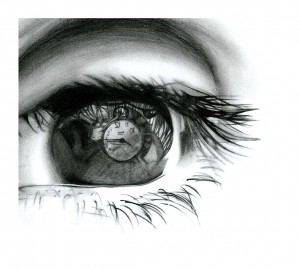Time in the modern world seems to be in short supply.

I recall staring out across Anzac Parade a few years ago, one hot afternoon in the weeks just before Christmas. The Rush was upon us, with parking wars aplenty, and shops overflowing as everyone scrambled their last minute arrangements. I was not immune by any means, feeling time slip away to organise services, music, BBQs, presents and somehow trying to feel faithful in the midst. Where was the sense of peace among us in all of this I wondered? And the vaguely troubling thought nagged away at me – how was I, our church, a witness to any way of peace amidst this frantic, snarling season?
Christmas is already starting to haunt our shopping centres, but the question still sits with me. Where do we find peace? Are we really busier than ever – or does it just feel that way?Michael Northcott in his chapter “Being Silent: Time in the Spirit”, makes the argument that,
“Modernity constructs the human experience of time as lack, as necessity; and as unreality. Lack arises from fear of death; necessity from the narration of the cosmos as a machine which is gradually unwinding, or a sun which is gradually dying, where finitude, limitation, being-without-end is problematized; unreality from the speed with which machines and communication devices bombard the individual with disconnected images and signs, stimulating and at the same time frustrating desire.” (Hauerwas and Well, 2004, “The Blackwell Companion to Christian Ethics”)
Have we really allowed our lives to be so focused, so constructed that time itself has become an unredeemed pressure, framing and forming us into iPhone-entranced zombies? And if so, what rhythms of our life together as church can we start to act out of that will transform us again?
Let me be honest. I don’t know.
But I’m excited to be exploring some practices together to find out. To sit in our “sermon of silence” for five minutes every Sunday has become a refreshing moment not to indulge my introvert nature, but to explore silence together as community. Reading Lauren’s recent reflections on our first prayer retreat – and in particular the challenge of Quaker silent worship – was incredibly encouraging. And strangely it was in reading this piece from Susan Carland, on the Islamic practice of the Hajj, which really stopped me in my tracks to ask, “What and who do I spend my time on?”
“The light around which the moth of my soul spirals is both telling and formative. What is at the centre of our being matters.”

Despite the fact that the title of this post made me think that it was going to be about daytime soaps, I love this entry.
The question of “what do I spend my time on?” is very present in my mind at the moment. As a person in a transition stage of life, moving from university into ‘real life’, I’m finding myself stressed and overwhelmed by the change. As my uni peers talk about interviews they’ve undertaken and casual work they’ve started (before uni has even finished, mind you) I’ve been starting to feel like there’s a pressure that I sort out my life. That I can’t just sit back and let things happen any more, but that I need to take charge of my life. That I should be applying for as many positions as possible and working as hard as I can to secure my future…and I haven’t even handed in my final assignment.
This week’s reflection allowed me time to stop and rethink.
“What is that I’ll spend my time on?”
And not just now and in the next week, but in the next year or five years or fifty years? What would it mean for me if I were to have a little trust in God? What if I didn’t have to feel so in-control of everything, but was willing to live in the uncomfortable waiting place for a while? And what if this could somehow bring me into a vocation that was not just about me securing my future, but was actually about God and I working together to bring about a better world. That seems like it might just be worth the discomfort.
Unsurprisingly, I come back to the lines of Psalm 130 (as it’s one of my favourites)
I wait for the Lord, my whole being waits,
and in his word I put my hope.
I wait for the Lord
more than watchmen wait for the morning,
more than watchmen wait for the morning.